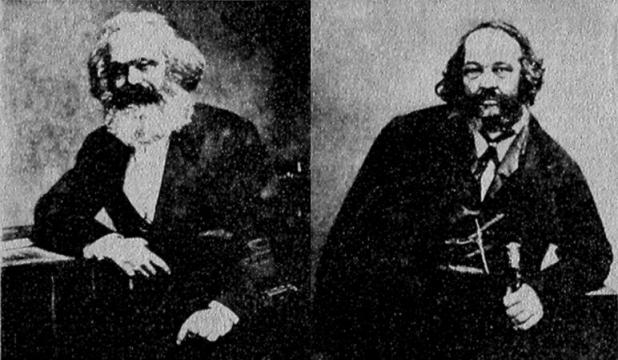
The dispute between Bakunin and Karl Marx highlighted the differences between anarchism and Marxism. Michael Bakunin strongly rejected Marx’s concept of the “dictatorship of the proletariat” in which the new state would be unopposed and would, theoretically, represent the workers.
We all know how
“In its struggle against the united power of the propertied classes, the proletariat can only act as a class if it constitutes itself as a political party, distinct and opposed to all the older political parties created by the propertied classes. This constitution of the proletariat as a political party is indispensable in order to insure the triumph of the social revolution and its highest purpose: the abolition of classes. The coalition of forces of the working class, already reached through economic struggle, shall also serve as a lever in the struggle against the political power of those who exploit the working class. Since the lords of the earth and of capital always use their political privileges to defend and perpetuate their monopolies and to subjugate labor, the conquest of political power has become the greatest duty of the proletariat.”
Bakunin, The Basic Bakunin, 99 [Le Socialisme libertaire, 162]: “Had they unfurled the flag of some political or antireligious system, they hardly would have united the workers of Europe, but instead would have divided them even more. . . . Moreover there is still too great a difference in the level of industrial, political, intellectual, and moral development among the working masses in various countries for it to be possible today to unite them around a single political, anti-religious program. To suggest such a program for the International and to make it an absolute condition for admission into that Association, would be to establish a sect, not a worldwide association, and it would destroy the International.”
Bakunin suggests that, if Marxism triumphs, the knowing intellectuals of the Party will take power on behalf of the people, becoming a new ruling class. ‘Scientific socialism’ is taken by Bakunin to mean a dictatorship by socialist scientists and professors. This would be the rule of the intellectual stratum discussed above.
Marx thought the workers of the world could unite, to seize the power of the ruling class, and elect a revolutionary government which would use authoritarian methods, to guide humanity to socialism.
Between capitalist and communist society lies the period of revolutionary transformation … Corresponding to this is a period of political transition in which the state can be nothing but the revolutionary dictatorship of the proletariat.
~ Marx, Critique of the Gotha Programme, 1875
Bakunin thought that an elected revolutionary government would behave like any other government.
What is the meaning of ‘the proletariat organised as a dominant class’? Does it mean the entire proletariat will be conducting public affairs? … Could it be that all these forty million will be part of the government, with the entire people governing and no-one being governed? … Marxists pretend that only dictatorship – of course their own – can create freedom for the people. To this we reply that no dictatorship can have any other goal but to endure as long as possible.
~ Bakunin, Statism and Anarchy, 1873
Here is how Bakunin’s ideas and David Graeber’s are simulare:
What’s the Point If We Can’t Have Fun?

